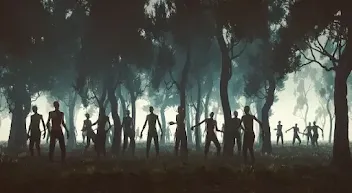#FACT: Did you know that the Ophiocordyceps fungus may transform a deceased insect into a zombie by releasing spores into its brain?
We'd be lying if we said we hadn't considered this subject before, and we aren't alone!
After witnessing a zombie film or television show, most people wonder if zombies exist.
If you're one of these persons, don't look any further—we've done a thorough investigation to clear the air!
After witnessing a zombie film or television show, most people wonder if zombies exist.
If you're one of these persons, don't look any further—we've done a thorough investigation to clear the air!
When did humans first become attracted by the concept of zombies?
To begin with, the concept of zombies was not always as popular as it is now. It was only in the late 20th century that zombies became a common theme in horror. Although the fear of the undead dates back to ancient Greek times, the idea of zombies originated in Haiti in the 17th century. Voodoo doctors in Haiti used mixtures that would paralyze their patients, inducing a coma-like state that made them seem dead when they were actually alive. There were accounts of these supposed zombies emerging from their graves days later. It is now understood that this phenomenon was due to toxins from pufferfish, but back then, it would have been terrifying for anyone!
Zombies are all around us. They're just not human.
The interesting aspect of zombies in nature is that the zombies themselves are not the scary part. Instead, it is the creatures or organisms that create these zombies that are truly terrifying. For example, the Ophiocordyceps fungus takes control of insects' minds and bodies. Within a few days of infecting the insect, the fungus gains complete control and compels the lifeless body to climb to a high place where it can spread its spores. Other examples of zombies in nature include worms that infect and manipulate hosts, as well as the unsettling jewel wasp. This wasp injects neurotoxins into live cockroaches, paralyzing them for up to a week, and then seals one of its eggs with the immobilized cockroach in a dark place. When the egg hatches, the young wasp has a ready meal waiting for it.
If "zombies" exist in nature, can people become them?
Sort of, however it depends on your definition of a zombie.
For example, Haitians who were poisoned with pufferfish toxins acted like zombies and "rose from the dead," so to speak.
There have also been occasions where humans have developed unusual diseases that cause them to behave similarly like zombies.
For example, Cotard's Syndrome causes people to believe they are dead or decomposing, with some patients requesting to be buried because they smell like rotting flesh.
In other situations, patients tried suicide to keep others from becoming like them.
For example, Haitians who were poisoned with pufferfish toxins acted like zombies and "rose from the dead," so to speak.
There have also been occasions where humans have developed unusual diseases that cause them to behave similarly like zombies.
For example, Cotard's Syndrome causes people to believe they are dead or decomposing, with some patients requesting to be buried because they smell like rotting flesh.
In other situations, patients tried suicide to keep others from becoming like them.
If you're curious about whether zombies like the ones portrayed on TV could actually be real, the answer is a definite no.
While a zombie apocalypse might seem intriguing in a morbid way, it's scientifically impossible for a deceased person to come back to life and mindlessly attack others.
Although people are revived daily through CPR, they don't awaken with a desire to consume human flesh.
Even if you're questioning the possibility of zombies in general, it remains a highly debated topic.
Insects controlled by fungus aren't technically deceased; they're manipulated to transport the fungus to a suitable area for spreading spores.
Even the zombification of cockroaches is temporary, as they return to normal after a week, unless a baby wasp has already drained their insides.
So, what's the conclusion? It all hinges on how you define zombies and your desire for their existence.
For those open to the idea of a zombie world, there could be arguments in favor of their existence in some form.
However, if you're more rational, you likely agree that traditional zombies, as we know them, are simply not real.
As for the possibility of zombies emerging in the future, that's a discussion for another time!





